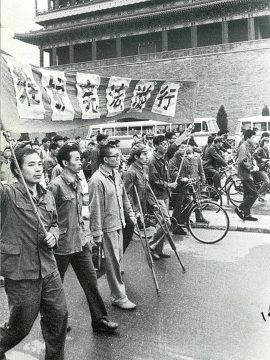James Wang at Eurozine:
 In short, Western narratives about China throughout the 1990s hinged on the logic that capitalist development must end with liberal democracy. In hindsight, however, precisely the opposite seems to have occurred in the People’s Republic. Rather than being a political albatross on the Party’s neck, the legacy of Tiananmen, the chaotic aftermath of Soviet collapse, and the difficulties in bridging east-west divisions in Europe, has paradoxically bolstered the Party’s legitimacy in China. Indeed, public opinion surveys in recent years have consistently found that a majority of Chinese citizens are not only content with the Party’s leadership but broadly more optimistic about their personal future and that of their country relative to those polled in the West. The same surveys also found that Chinese people tend to be unsympathetic to proposals for major shifts in China’s current political framework. Moreover, positive opinions regarding one-party rule in China seem to have consistently grown in the last two decades.
In short, Western narratives about China throughout the 1990s hinged on the logic that capitalist development must end with liberal democracy. In hindsight, however, precisely the opposite seems to have occurred in the People’s Republic. Rather than being a political albatross on the Party’s neck, the legacy of Tiananmen, the chaotic aftermath of Soviet collapse, and the difficulties in bridging east-west divisions in Europe, has paradoxically bolstered the Party’s legitimacy in China. Indeed, public opinion surveys in recent years have consistently found that a majority of Chinese citizens are not only content with the Party’s leadership but broadly more optimistic about their personal future and that of their country relative to those polled in the West. The same surveys also found that Chinese people tend to be unsympathetic to proposals for major shifts in China’s current political framework. Moreover, positive opinions regarding one-party rule in China seem to have consistently grown in the last two decades.
In the Party’s own triumphalist narrative, 1991 and 1999 stand out as two watershed moments. From Beijing’s perspective, the anarchy of the collapse of the Soviet Union, and Yeltsin’s cynical crushing of parliamentary opposition, furnished a perfect counter-narrative to June 4th, 1989. As Russia, China’s former Cold War arch-rival, sank into economic freefall, rampant corruption, and a period of geopolitical irrelevancy, China’s communist party leadership was able to guarantee political stability and engineered three decades of uninterrupted economic growth.
more here.
